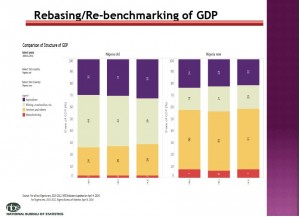Mine is the kind of household where we spent Sunday afternoon eagerly waiting for the announcement about the rebasing of Nigeria’s GDP, or in other words the updating of the weights on the different components that add up to GDP to reflect their share in the economy. Like a number of other African economies, it had been more than 20 years since the construction of Nigeria’s GDP statistics was last updated in this way. It happens roughly every five years in most OECD countries – the US had a significant one last year.
The announcement was worth waiting for: taking due account of sectors like films, music and mobiles took the level of GDP up by 89%, and makes Nigeria’s economy bigger in absolute terms than South Africa’s. The rebased statistics also show a marked change in the structure of the economy, as this chart from the official presentation shows.

Nothing real has changed, the economic problems like poverty and inequality and a poorly-functioning state remain, but the confidence effects on investors and entrepreneurs could be significant. Expectations are crucially important for economic decisions.
As it happens, if you want to read more about this, my [amazon_link id=”0691156794″ target=”_blank” ]GDP: A Brief But Affectionate History [/amazon_link]has a section specifically on the subject. Razia Khan of Standard Chartered, @raziakkhan, kindly tweeted key bits of it yesterday, and is a key person to follow on the subject.
[amazon_image id=”0691156794″ link=”true” target=”_blank” size=”medium” ]GDP: A Brief but Affectionate History[/amazon_image]
